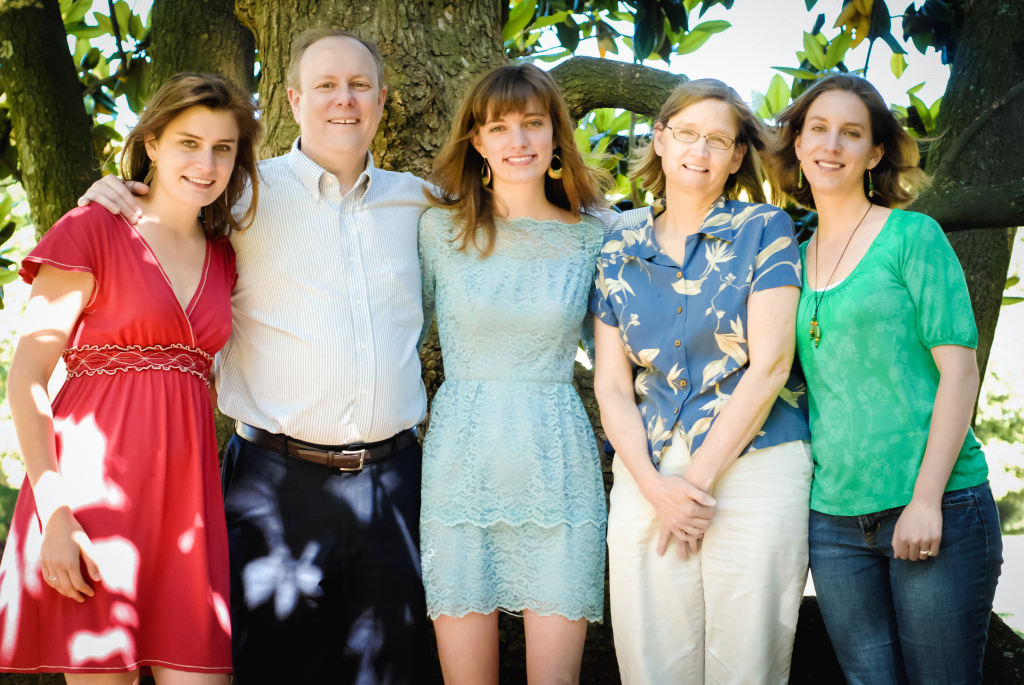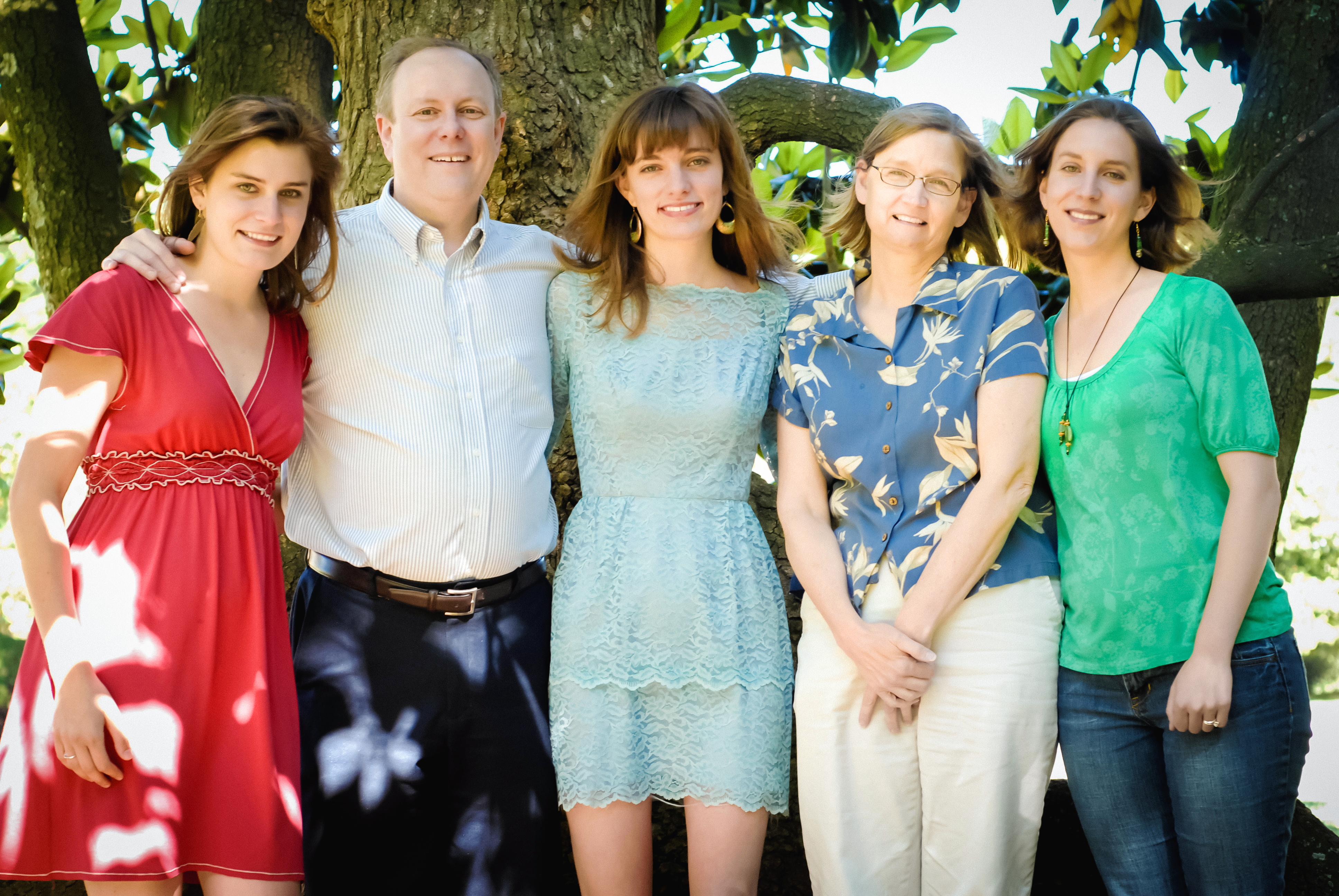
Fight or flight: I ran away from my mother’s diagnosis, when I returned I was ready to care

Carrie (center) and her family
My first encounter with the term “Alzheimer’s disease” was during a family reunion during Christmas break after my first semester of college. My parents gathered my sisters, brother-in-law, and I in their room to tell us mom had been diagnosed with Early Onset Alzheimer’s disease, and that she had been told she had 5 to 7 years left to live. As the words came out of my dad’s mouth, he melted into body-shaking sobs. I had never seen him cry, and a wave of fear and panic came over me. All of us – my sisters, mom, brother-in-law – also broke down sobbing. How could our mom – smart, capable, hardworking, beautiful inside and out, ever loving – have a disease that would rob her of who she was as that person? The shock of this announcement made it seem like it came from nowhere, but looking back, there were signs along the way.
Something’s wrong with mom
Before that fateful morning, my mom and I were taking a road trip to visit prospective colleges on my short list. During that time her sister’s terminal cancer diagnosis was top of mind for her. After our third and final visit, my mom burst into tears and silently sobbed for our entire 12-hour ride home. This uncharacteristic display of raw emotion from the strong, loving matriarch of my family, jolted me out of my teenage angst. And for the first time in my life, I sensed that something was deeply wrong with my mom. Some months after the road trip, we were gathered in the living room, as my mom held up a “Reader’s Digest” and explained to us that she read an article in it three times and was still unable to comprehend what it was about. This, coming from a woman with a Master of Science in speech pathology and a voracious appetite for reading, seemed to be the first crack in the solid ground beneath me, which continued to disappear in the years that followed. Like many who find themselves confronted with this disease, I found myself angry, afraid, depressed, and heartbroken as I hobbled through my life and tried to no avail to find stability.
Flying away from my mom and myself
In the immediate years following my mom’s diagnosis, I was self-absorbed, lost, afraid. I became avoidant of my mom. I resented my mom for having this disease, telling myself that somehow it must be her fault. I was angry at her for having this untimely and terrible illness. Logically, I knew these thoughts were irrational, but they persisted in my mind regardless, and I struggled not only with the reality of a dying parent, but also with the shame and guilt caused by my reluctance to engage with her. Another invasive thought that began to creep up during this time was my obsessive belief that I too would follow the same trajectory as my mom – starting to have symptoms like she did in my early 40s, and I decided to live my life as though it was halfway over. With my self-imposed timer ticking away, coupled with my “out of sight, out of mind” approach to dealing with our family’s situation, I found the perfect solution – literal escape. I threw myself into travels that would challenge my physical, emotional, intellectual abilities, making sure each trip was coupled with volunteerism and service. After all, as I told myself, if I was helping other people, I could make amends for what I was not facing with my mom and family. Following her diagnosis, I left college for a semester and went to live in the Costa Rican rainforest as an environmental educator. Upon returning to college to major in Public Health, I spent a semester doing research at an NGO health clinic in a slum just outside of Cusco, Peru, eventually leading a project to build them an open source electronic medical record system. After graduating, I moved to Seattle briefly, before finding the best escape possible, The Peace Corps, uprooting my life for 2 years to move to the Dominican Republic. While in the Peace Corps, I struggled with the ache in my heart propelled by guilt, shame, anger, fear, and frustration, and my main companion was that screaming voice in my head that berated me for being selfish, useless — a bad daughter. But that wasn’t true at all. I knew my mom would be proud of the person I had become through these years of service. When I finally went home, I finally understood that it wasn’t out of guilt or shame — it was to share my life’s journey with my mom in her final days. I was ready to return to the battlefield at home to serve my mom and my family in the ways I had discovered within myself while abroad.
Realizing it was time to fight for mom
Like others with Alzheimer’s disease, my mom’s experience went through many phases, and as her caregiver, I journeyed through those phases with her. What I found on this journey was that as frustrated and exhausted as I got sometimes, there were moments where we were still bonded tightly. One of those is a memory I will treasure for the rest of my life: During the phase where she wanted to go home, she became terrified of the house where she lived that no longer registered as her own. It often took my dad or I until the wee hours of the morning to get her to stop pacing, attempting to flee our house as soon as we weren’t looking. Whether it was exhaustion, or the late hour causing me to feel giddy, in the midst of this we had this exchange: Me: “Mom, why don’t you lay down in the bed and rest for a little bit?” Mom: “But are you sure your parents won’t mind?” (After all, her bed was not really her bed!) Me: “Oh, they definitely will not mind! Here, want to put on these pajamas?” Mom: “You’ll let me borrow your pajamas?” Me: “Of course!” And then once we laid down in her bed Mom: “We sure did have some good times growing up.” Me: “Yes, we did!” In this moment, I was her best friend. We lived a moment together that wasn’t possible for us to even have in my reality, but in hers, we were able to expand our experiences together, and as I cuddled with her as she fell asleep, I was her best friend and confidant, and it didn’t matter if she knew I was her daughter or not.
What I’ve learned
As my mom progressed, she continued to teach me lessons that I keep to this day. Even if the evenings were tumultuous and stressful for her and me as she tried to escape her house; even if she sometimes fell and injured herself due to her failing vision; even if my heart broke as I watched her sob at the prospect of a male CNA helping her with a bedpan and seeing her in an “undignified way”—always, the next morning, we started out with our coffee and listened to my sister’s album of songs she had produced years before. Her face was peaceful and the moments of the night before were nowhere in sight. She taught me to practice letting the pain go for myself, just as her brain had allowed her to do so. Many times we’re tempted to only remember our loved ones as they were “before”, but for me, I remember my mom, in her fading days, teaching me to let go. Memory is a strange gift, and in some ways, Alzheimer’s disease forces us to consider its nature. For a typical person, we measure time linearly, we gather up present moments and as soon as they pass store them into past memories then process and consider these to make plans for what future moments to come. For someone living with Alzheimer’s disease, moments only exist as a tangent line, a circle, where as soon as a moment takes place, it disappears and makes space for the next moment to come. These moments can be horrifying, heart breaking, puzzling, frustrating, disgusting, sad, vulnerable, surprising, frenzied, scary, peaceful, tender, hilarious, happy, joyous, fun, loving, triumphant, beautiful – the list goes on. The important thing is that we’re there to experience them together. Carrie Shaw works at the intersection of health education and virtual reality storytelling. Carrie’s experience caring for her mother, who had Early Onset Alzheimer’s disease, opened her eyes to the needs of caregivers and the aging services workforce, leading her to complete a Master’s of Science in Biomedical Visualization and eventually found her company, Embodied Labs. Today, Carrie is the CEO and founder Embodied Labs, an immersive education and wellness platform for professional and family caregivers and the older adults they serve.


